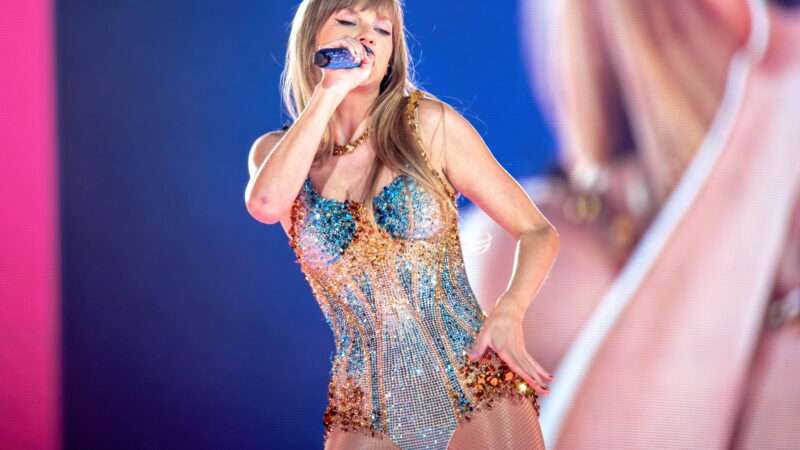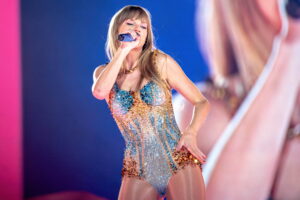

A recent Monmouth poll finds that 18% of Americans and 32% of Republicans believe there is a "a covert government effort for Taylor Swift to help Joe Biden win the presidential election." The percentage of believers is higher among the 46% of Americans who have previously heard of the Swift conspiracy theory, and is especially high among Republicans who had previously heard of it (44% of that subgroup said they believed such a covert effort exists). As more Republicans learn of this conspiracy theory, more might come to believe it.
Over the last few weeks, some conservative activists and online "influencers" have promoted the absurd conspiracy theory that Taylor Swift's relationship with Kansas City Chiefs player Travis Kelce is actually a "deep state" government "psyop" designed to help Biden win the election (presumably, Swift -grateful for being set up with Kelce and resulting publicity, will endorse Biden in exchange). Large numbers of Republicans (though still a minority) now apparently believe it! In fairness, some of those who told Monmouth they believed in the existence of the "covert government effort" might have had some other type of conspiracy in mind. But the one involving Kelce has gotten the broadest circulation.
I won't spend much time and effort refuting the Swift-Kelce conspiracy theory. Suffice to say that Swift is a billionaire and the most popular celebrity in the world. She doesn't need the help of Deep State Democrats to either find men to date or generate publicity for her music. And if the White House wanted Swift to endorse Biden, they could probably achieve that goal just by asking her. After all, she did endorse him in 2020, apparently without getting anything in exchange (though I suppose conspiracy theorists can argue that whoever she was dating back then was actually a Deep State plant).
In and of itself, widespread belief in the Taylor Swift conspiracy theory probably doesn't matter much. It almost certainly won't change the outcome of the presidential election. Nor is it likely to impact government policy in any meaningful way.
The problem is that the kind of credulousness on display here is also evident in many voters' beliefs in a wide range of other conspiracy theories. The Washington Post gives some examples in its story on the Monmouth poll:
-
An August 2022 YouGov poll after the search of Mar-a-Lago showed 38 percent of Republicans believed the FBI planted evidence there. Just 23 percent disagreed with that proposition (another 39 percent were "not sure").
-
A YouGov poll the next month showed a majority of Republicans said it was at least "probably true" that the FBI planted classified documents.
-
A Suffolk University poll shortly after Jan. 6, 2021, showed 58 percent of Donald Trump supporters said the Capitol riot was "mostly an Antifa-inspired attack that involved only a few Trump supporters." There remains zero evidence for this.
-
A recent Washington Post-University of Maryland poll showed 34 percent said it was at least "probably true" that the FBI organized and encouraged the attack on the Capitol. (About half that number believed there was "solid evidence" of this.)
-
YouGov polling in December showed 42 percent of Republicans believe "many top Democrats" are caught up in child sex-trafficking rings, 35 percent believe mass shootings have been faked to promote gun control, and 28 percent believe the government used covid vaccines to implant microchips in people.
-
The same poll showed fully 60 percent of Republicans believe there is "a single group of people who secretly control events and rule the world together." (Democratic support for the proposition was about half — 28 percent.)
-
And, of course, polls generally show around 6 in 10 or more Republicans continue to believe the 2020 election was stolen from Trump, despite the complete lack of evidence more than three years later.
These are all examples of right-wing voters' credulousness—none more consequential than continued widespread belief in Donald Trump's "Big Lie" about the 2020 election. But there are plenty of left-wing examples of widespread ignorance and belief in misinformation, as well. Notable cases include 9/11 "trutherism" (disproportionately embraced by people on the left) and belief that "the Jews" were at least partly responsible for the 2008 financial crisis (much more common among Democrats than Republicans). Overall, it appears left-wingers and right-wingers are about equally susceptible to conspiracy-mongering. Both tend to be more open to conspiracy theories that reinforce their preexisting views than those that cut against them.
As I've explained before (e.g. here, here, and here), this is part of the more general problem of voter "rational ignorance" and bias. Because there is so little chance that any one vote will influence an electoral outcome, most voters have little incentive to devote more than minimal time to learning about political issues. Their ignorance makes them more susceptible to conspiracy theories and other misinformation.
That problem is further exacerbated by the lack of incentive to objectively evaluate whatever information the voters do learn. In considering political information, many voters act not as objective truth-seekers, but as "political fans" who tend to overvalue any claims that cohere with their preexisting views, and downplay or ignore any that cut against them. Just as sports fans tend to be biased in favor of their favorite team, political fans are biased in favor of their preferred party, ideology, and leaders—and against their rivals.
At this moment in history, I think right-wing political ignorance and bias are greater menaces than that on the other side of the political spectrum. Over the last few years, lies and disinformation spread by Trump and his supporters—particularly the Big Lie—have had more impact than their left-wing counterparts. But, whether or not you agree with me on that, it's important to recognize the enormous scope of the problem—and the fact that it isn't limited to one side of the political spectrum.
Recognizing the problem cannot, by itself, solve it. But it's at least a step in the right direction. I consider a variety of potential ways to mitigate political ignorance and bias in this recent article and in my book Democracy and Political Ignorance.
UPDATE: I have made minor additions to this post.
UPDATE 2: I have fixed what was previously an incorrect link to the Monmouth poll.
The post Taylor Swift and Political Ignorance appeared first on Reason.com.

.png?w=600)





